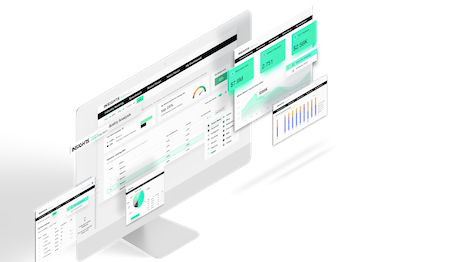 Marketers looking to measure the effectiveness of digital strategies should look no further than Launchmetrics’ new report, The State of Measurement 2022. Image courtesy of Launchmetrics
Marketers looking to measure the effectiveness of digital strategies should look no further than Launchmetrics’ new report, The State of Measurement 2022. Image courtesy of Launchmetrics
Maintaining a keen grasp on KPIs is more crucial than ever for luxury fashion and beauty brands looking to drive value in a dynamic digital landscape.
Fashion cloud technology platform Launchmetrics has released The State of Measurement 2022, its first-ever analysis of attribution in digital marketing, in partnership with digital consulting company Publicis Sapient. The report addresses critical questions about measuring the offline impact of online activations.
Report findings are based on a 2021 survey of 1145 marketing, communications and public relations professionals working across fashion, luxury and beauty in the U.S., Europe and China.
Matters of measurement
Marketers looking to measure the effectiveness of digital strategies should look no further than the learnings listed in Launchmetrics’ new report.
As brands face managing a record amount of consumer data, many are asking what digital practitioners are to make of these metrics, and which matter most to transforming the business. Launchmetrics lays out the answers to this and many other issues, using statistics and brand case studies to make the case for smarter marketing strategies and spending.
The State of Measurement 2022 outlines four core focus areas, detailing the challenges and imperatives associated with each. These areas include: establishing a uniform marketing attribution standard, moving social strategies beyond awareness towards conversion, tapping market benchmark tools and scaling personalization.
 A troubling marketing attribution statistic is addressed within the new report. Image credit: Launchmetrics
A troubling marketing attribution statistic is addressed within the new report. Image credit: Launchmetrics
According to the report, a majority of marketers and data scientists think creating a unified window into marketing performance should be prioritized by brands, many of whom currently lack this level view. Brands can lend support to attribution efforts by establishing a stable measurement infrastructure, enabling leaders to make better, data-driven business decisions.
Beyond standardizing and in light of a rapidly evolving industry, many marketers are being left in the dark, unable to identify relevant KPIs or generate actionable data insights.
Launchmetrics’ findings suggest that digital professionals could benefit immensely from brand-sponsored upskilling opportunities such as data literacy training, empowering these practitioners to provide the meaningful analysis necessary to keep up with modern customer demand.
Next, digital campaigns solely aiming to drive awareness will no longer suffice. Marketers must integrate specific business objectives and conversion into their social strategies, to stay competitive.
 Owned media channels, not influencers, are best for driving awareness, outperforming influencers by an average of 17 percent. Image credit: Chief Outsiders
Owned media channels, not influencers, are best for driving awareness, outperforming influencers by an average of 17 percent. Image credit: Chief Outsiders
While 80 percent of marketers are using sales to measure influencer performance, referral links are just the tip of the iceberg when it comes to the tools available to brands to hold influencers accountable for engagement. Live streaming and shoppable ads are great starting points for teams in search of a wider spectrum of social tactics.
On a related note, recognizing the significance of competitive benchmarking, or seeing where results land as compared to market peers, is pivotal, yet 31 percent of respondents surveyed said that finding the proper benchmark tool software stands as one of their marketing teams’ biggest challenges.
In a vein similar to scientific theory, the process of interpreting data is incomplete without a control group. Investment in industry benchmark tools that contextualize data, revealing where a brand stands, is necessary for extracting valuable insights and gauging strategic success, according to Launchmetrics.
Finally, scaling real-time personalization, and measuring its impact concurrently, can help brands cut through a crowded environment and avoid blending in by generating indistinguishable content. With a lack of adjustment, labels risk falling victim to the 52 percent of consumers that will actively cut non-tailored brand communication.
With improvements in these four areas pertaining to measurement, brands can expect to optimize ROI and build equity with consumers amid a market giving them more choices than ever and an economically uncertain future on the horizon.
Tools of the trade
Making resources available to the luxury industry, Launchmetrics continues to enhance its own digital marketing capabilities.
Earlier this year, the platform announced its acquisition of a key competitor, media planning consultancy DMR, in a move that entitled the company to renowned innovative technology and DMR’s data of 20 years. The platform is now the SaaS provider to more than 1,200 fashion, luxury and beauty brands, with the move marking Launchmetrics' fifth acquisition (see story).
Additionally, boutique brands and luxury entrepreneurs should not be deterred from adapting The State of Measurement 2022's findings.
Smaller firms like consumer data analytics company Lily AI, cofounded by economist Purva Gupta, are also helping brands retrieve clear data points to better serve consumers. As shared during Luxury Daily’s Women in Luxury eConference in June 16, the company has fielded increased interest for stronger demand forecasting resources, further credentialing Launchmetrics' observations (see story).
While demand for better data remains high, brands can rest assured that there are a number of readily-available resources that can help marketers decode their customer base.